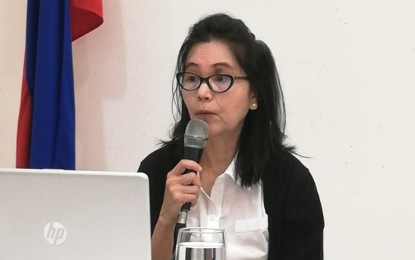
Dumaguete City Health Officer Dr. Ma. Sarah Talla. (Photo by Judy Flores Partlow)
DUMAGUETE CITY -- A total of 250 “persons using drugs” here have been assessed to be qualified for the community-based treatment and drug rehabilitation program of the government.
At a "Kapihan sa PIA" forum Monday morning, City Health Officer Dr. Maria Sarah Talla said the number represents only 27.6 percent of the 905 total “surrenderers” since 2017 to date, following the launch of President Rodrigo Duterte’s campaign against illegal drugs.
Surrendered drug users are identified through the Philippine National Police (PNP) and referred to the City Health Office to be assessed whether their cases are mild, moderate, or severe, Talla said.
Those with mild and moderate affectation are qualified for the community-based treatment and rehabilitation program while those that are severely affected are recommended to a facility-based rehabilitation center, she added.
Talla said for male cases with severe affectation, they are recommended to a facility in Argao, Cebu, while female cases are recommended to the Eversly facility in Mandaue City, Cebu.
The city initially started out with the community-based treatment and rehabilitation program at the City Health Office but now there is an existing program in the barangays.
“Once we have received the list from the PNP (Philippine National Police) of drug surrenderers, we schedule our visits per barangay for assessment,” Talla said.
She said the city has a program called ASSIST-BI (alcohol, smoking, substance involvement screen test with a brief intervention) which they use in assessing a surrenderer.
The nurses go to the barangays and sometimes she goes with them to do the assessment, Talla said.
Meanwhile, the City Health Office, with the help of the provincial Department of Health, has conducted the Matrix Intensive Outpatient Program (MIOP) for members of the Barangay Anti-Drug Abuse Councils (BADACs) with six representatives per barangay to capacitate them to conduct their own MIOP sessions.
In 2018, there were 70 enrollees for the first batch but only 14 graduated or about 20 percent, Talla said.
In the second batch, there were 16 enrollees with only nine graduates and in the current year, only 16 had enrolled in the program and half of them graduated, she added.
Currently, Barangay Motong has 20 enrollees. It is almost done with 14 sessions since July and is waiting for a DOH evaluation. Barangay Poblacion 8 has two enrollees, and is also almost done with the sessions, while Barangay Calindagan, which only started last month, has 17 enrollees.
Talla said she is hoping the other barangays will follow suit and conduct their own MIOP as the number of those assessed versus the total number of those who had surrendered under the government’s Oplan TokHang program is very low.
Asked about the low turnout, she said their role is only to assess those in the list from the PNP to determine who are qualified for the community-based treatment and rehabilitation program. She added that they are not involved in the monitoring of the surrenderers who had come forward and voluntarily submitted themselves to the police to cooperate with the government’s anti-drug campaign. (PNA)
